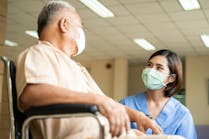Although the Centers for Disease and Prevention (CDC) reports no known cases of Ebola transmission in the United States, a Harvard School of Public Health shows that four in ten (39%) adults in the U.S. are concerned that there will be a large outbreak in the U.S., and a quarter (26%) are concerned that they or someone in their immediate family may get sick with Ebola over the next year. The nationally representative poll of 1,025 adults was conducted August 13-17. The margin of error for total respondents is +/-3.6 percentage points at the 95% confidence level.
The poll found people with less education are more likely to be concerned about an outbreak in the U.S. (less than high school 50%; some college 36%; college grad or more 24%). People with less education are also more concerned that they or their family will get sick with Ebola (less than high school 37%;. some college 22%;. college grad or more 14%). Those with less education are also less likely to be following the news about the Ebola outbreak in West Africa closely (total 63%; less than high school 57%; some college 62%; college grad or more 73%).
Sixty-eight percent surveyed believe Ebola spreads “very easily” or “somewhat easily” from infected people. This perception contrasts with information being provided by the CDC, World Health Organization (WHO), and other health experts who note that Ebola is not an airborne illness, and is transmitted through direct contact with infected bodily fluids, infected objects, or infected animals.
A third of those polled (33%) believe there is “an effective medicine to treat people who have gotten sick with Ebola.” According to the CDC and WHO, there is no proven anti-viral medicine; however, treating symptoms—such as maintaining fluids, oxygen levels, and blood pressure—can increase the odds of survival. Read the latest on Ebola from the CDC website.
Read more




